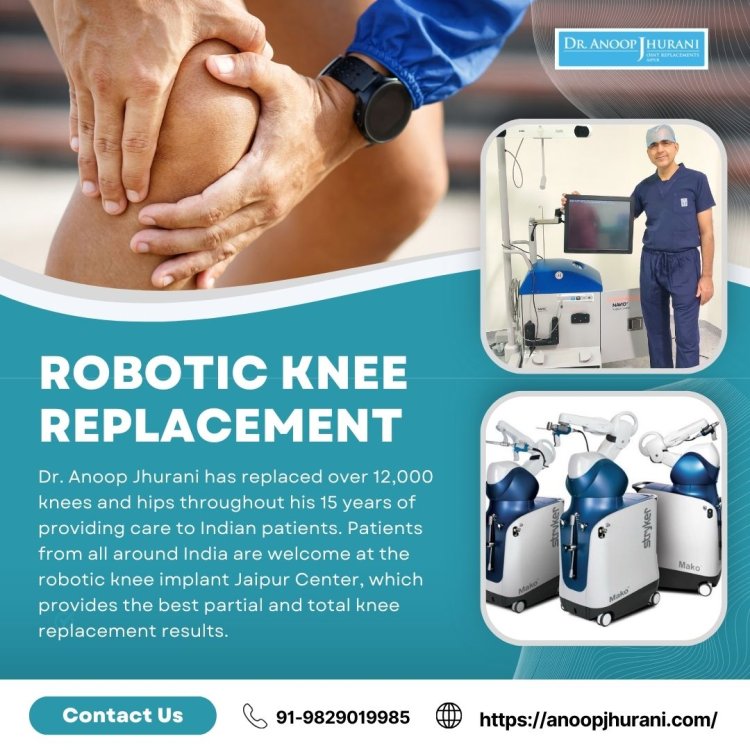Robotic Knee Replacement: Transforming Orthopedic Care in India
Dr. Anoop Jhurani is a Robotic knee replacement doctor in Jaipur, India. Book an appointment online with Dr. Anoop Jhurani for treatment.
Share this Post to earn Money ( Upto ₹100 per 1000 Views )

Robotic knee replacement surgery has revolutionized orthopedic care by providing precise, minimally invasive solutions for patients needing knee replacement procedures. In Rajasthan and Central India, under the expert leadership of Dr. Anoop Jhurani, robotic-assisted knee surgery is becoming the go-to solution for patients seeking relief from debilitating knee conditions. With over 12,000 knee and hip replacements performed in his 15 years of practice, Dr. Jhurani is one of the best robotic knee replacement surgeons in Jaipur, India.
Materials Used in Knee Replacement Implants
Knee replacement prosthetics are composed of various materials, each chosen for its strength, durability, and compatibility with the human body. Some of the most commonly used materials include:
· Cobalt-chromium (Metal Alloy): Often used for the femoral components of the implant, cobalt-chromium provides exceptional strength and resistance to wear, making it ideal for high-stress areas of the knee.
· Titanium (Metal Alloy): Titanium is another popular choice for the tibial tray component of the implant due to its lightweight properties and compatibility with human bone. It is often used in Osseointegrated implants, promoting natural bone growth around the implant.
· Oxidized Zirconium (Metal-Ceramic Alloy): This material is sometimes used for the femoral components due to its hardness and resistance to wear, offering a smooth articulation surface.
· Polyethylene (Plastic): It is used to make the spacer that sits between the metal components of the knee implant, as well as the patellar and tibial components. This high-quality plastic provides a smooth, durable surface that mimics the natural movement of the knee joint.
Achieving Better Outcomes with Robotic Knee Surgery
The introduction of the MAKO robotic system has significantly improved the precision and outcomes of knee replacement surgeries. By leveraging advanced 3D modeling and real-time data, robotic systems allow surgeons like Dr. Jhurani to create personalized surgical plans tailored to each patient’s anatomy. This level of precision results in better alignment of the prosthetic components, reducing wear on the implant and extending its lifespan.
Additionally, robotic surgery helps minimize the risk of complications such as infection, blood loss, and damage to surrounding tissues, all of which contribute to a faster and more comfortable recovery. Most patients can expect to return to their daily activities more quickly than with traditional surgery, and the overall success rates of robotic-assisted knee replacements are higher.
Conclusion
Robotic knee replacement surgery, led by specialists like Dr. Anoop Jhurani, represents a major leap forward in orthopedic care for patients in Rajasthan and Central India. With the ability to customize the materials and design of each knee implant and the precision offered by robotic systems, patients can enjoy improved outcomes, faster recovery times, and longer-lasting prosthetic joints.
For those suffering from knee pain or joint degeneration, seeking out a consultation with a robotic knee replacement expert like Dr. Jhurani could be the first step toward regaining mobility and enhancing quality of life. Whether you need a partial or total knee replacement, the future of orthopedic surgery is here, and it’s robotic.















